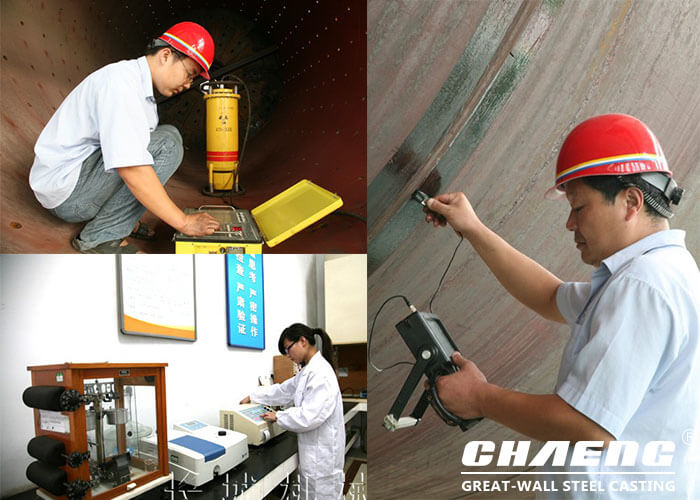Newsroom
What is level-two flaw detection on steel castings?
2018-01-15 | Editor:
As we all know, steel casting parts are required to perform the flaw detection in the finishing and machining stages to further detect the internal defects of steel castings, such as: cracks, shrinkage and so on. According to testing methods, flaw detection can be divided into: ultrasonic testing, magnetic particle inspection, color testing, and ray inspection. Steel casting manufactures mainly use three kinds: ultrasonic testing, magnetic particle inspection, and color testing. And the flaw detection is divided into level-one, level-two, level-three testing standards.
Usually, the general steel casting manufacturers can reach the level-three testing standard, and a few manufacturers can reach the level two. Nowadays, for large steel castings, in particular those with complicated structures and working in harsh environments, users require that the important parts of steel castings must to reach the level-two flaw detection, such as slag pot trunnion, the inner side of rolling mill housing, Inside wall of fuselage and so on.
CHAENG has been able to meet the customer's level-two flaw detection requirements to ensure that the internal quality of steel castings, at the same time, CHAENG also is able to meet the requirements on the appearance quality, through grinding, shot blasting, painting and other technologies, to reach the standard of high finish and ensure the both inside and outside the quality of steel castings.

Usually, the general steel casting manufacturers can reach the level-three testing standard, and a few manufacturers can reach the level two. Nowadays, for large steel castings, in particular those with complicated structures and working in harsh environments, users require that the important parts of steel castings must to reach the level-two flaw detection, such as slag pot trunnion, the inner side of rolling mill housing, Inside wall of fuselage and so on.
CHAENG has been able to meet the customer's level-two flaw detection requirements to ensure that the internal quality of steel castings, at the same time, CHAENG also is able to meet the requirements on the appearance quality, through grinding, shot blasting, painting and other technologies, to reach the standard of high finish and ensure the both inside and outside the quality of steel castings.

So what is the difference between level-two and level-tree flaw detection? And what are the advantages of level-two flaw detection?
Minister Wang of Production Department of the Great Wall Steel Casting gave us an answer. "The biggest difference between level-three and level-two flaw detection lies in the testing standards for internal defects of steel castings. Level-two flaw detection is more stringent than the lvel three, requiring fewer and smaller defects, such as: level-three detection requires shrinkage can’t bigger than 10mm, while level-two detection requires shrinkage can’t bigger than 5mm. " Minister Wang explained.
Of course, relatively speaking, the level-two flaw detection standards are higher, it is different for many casting companies to make all parts of steel casting reach level-two standards, and the cost is high for buyer. Therefore, under normal circumstances, the just critical parts of large castings must meet level-two flaw detection.
Order online
Fill out your message and submit it . Options with * must be filled in.
Prev:Maintenance and spare parts for slag vertical roller mill
Next:Structure of support roller and bearing for environmental protection rotary kiln
PRODUCTS
CONTACT
- Tel: +8615290747879
- Whatsapp: +8615290747879
- E-mail: casting@chaeng.co
- Skype : GreatWall1958


